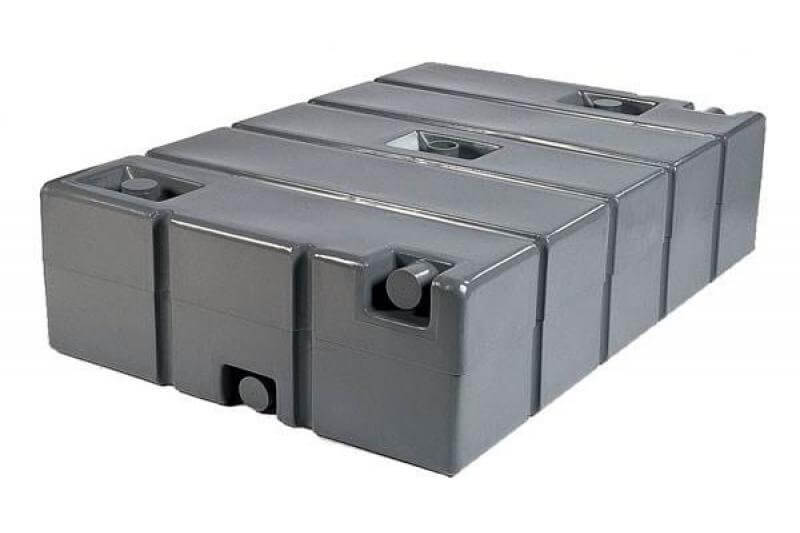Just as the name suggests, an above-ground septic tank is a septic system that is built above the ground unlike conventional systems which are typically buried.
These types of systems are usually installed as an alternative solution in areas where conventional systems may not be practical e.g. if the risk of septic system failure is high.
Because septic tanks aren’t FDA approved to hold or transport potable water, there is often some confusion as to whether one can legally install an above-ground septic system.
The best place to begin to address the question would be to first understand scenarios where conventional systems may not be feasible.
There are three main areas where an above-ground septic system may be more practical than a conventional system. These are:
Area with a high water table
In conventional systems, the distance between the water table and the drainage field should be enough for the wastewater to undergo sufficient treatment before reaching the groundwater.
However, some areas have a high water table which would make conventional systems impractical.
If the wastewater gets to the groundwater before it is sufficiently treated, it will pollute the ground water which will mean the drinking water will be polluted.
Restricted layers
A restricted area refers to a shallow soil layer that is above a big layer of porous bedrock or clay.
It may also refer to perched groundwater that is in between soil and rock.
Such restricted layers are not ideal for conventional septic systems because the soil conditions are unfavorable for the proper treatment of wastewater as it filters through the soil.
Soil with bad permeability
Too slow or too fast permeability are both not ideal for septic systems.
If the soil is highly permeable (e.g. sandy soils), the percolation rate will be too fast which ultimately means effluent will not be treated thoroughly before it percolates through the soil.
On the flip side, soils that have low permeability (e.g. clay soils) will cause the water to percolate too slowly which will result in water-logged soils.
Ponding is hardly ideal with septic systems as it causes pollution.
If your soil falls in any of the three categories above, you will have no choice but to think of using an alternative to conventional systems.
Even though advanced systems are often thought of as the only viable option, you can as well go for an above-ground septic system.
Are Above-Ground Septic Tanks Legal?

Above-ground septic tanks may not be popular but that doesn’t necessarily mean they are illegal.
However, this may vary depending on your location.
The EPA makes it clear that they do not regulate single-family septic systems.
Such regulation is devolved to the respective state governments and local authorities.
Most regions have developed detailed frameworks and enacted supportive laws that should guide users on the installation of above-the-ground systems.
For instance, the Washington State Department of Health allows residents that have only 1-2 inches of suitable soil to install a mound system.
You can check with your local health department for the code on mound systems.
Apart from letting you know if it is legal to install one, the code will also stipulate how and when you are allowed to install one.
For instance, the law in Virginia requires homeowners to install their mound systems during dry weather.
You may also want to check: What Is An Illegal Septic System?
Disadvantages of Above-Ground Septic Systems
There are two main disadvantages of above-ground septic systems:
- In conventional systems, water leaves the house via gravity and that makes it easier for the system to separate the solid and liquid waste in the tank. In above-ground systems, pumps may be required and there is the danger that the pump will break up the waste into small pieces which means the waste will not settle down in the tank as should have been the case. The broken-up solids will then pass through the tank with the rest of the liquid waste before they are broken down by bacteria which could lead to groundwater pollution.
- A conventional system is relatively immune to weather cycles and elements. However, the same cannot be said of above-ground systems because they can easily get affected by extreme weather patterns. For instance, an above-ground septic system can easily freeze in winter. Also, the harsh light from the sun could cause the components of the system to deteriorate.
What to Do If the Above-Ground Septic System Fails
According to the EPA, a failed or failing septic system can for the most part be blamed on poor maintenance or construction.
In other words, as long as the system was installed correctly and you follow the required maintenance procedures, the system should work like a charm for years without any issues.
That said, it is still possible to find yourself with a failed or failing system for other reasons –e.g. after a hurricane or another natural catastrophe.
The first thing to do if your septic system fails is to call a skilled septic tank professional right away.
If the issue is not severe, the contractor should be able to fix it without much incident.
However, in severe cases, you might be required to install a new system altogether.
The contractor should also advise you whether you need an inspection from the local authority depending on your local laws.
In summary…
Above-ground septic systems can come in handy for homeowners who may not be able to install conventional systems on their property.
Be sure to check with the local health office to ascertain if you are allowed to install such a system.
Additionally, remember to maintain the system as required to avoid having to deal with a failed system.
